Fight! The most beautiful gesture on the road to poverty alleviation —— Scanning the poverty-stricken people in four southern Xinjiang states
Xinhua News Agency, Urumqi, September 10th Title: Struggle! The most beautiful gesture on the road to poverty alleviation —— Scanning the poverty-stricken people in four southern Xinjiang states
Xinhua News Agency reporters Gao Han, Guan Qiaoqiao and Liu Hongxia.
Kashgar, Hotan, Aksu and Kizilsu Kirgiz Autonomous Prefecture, four prefectures in southern Xinjiang, are one of the "three districts and three states" deep poverty-stricken areas determined by the state, and the poverty-stricken population is close to half of the "three districts and three states", with poor natural endowment and weak infrastructure, which is the difficulty and focus of poverty alleviation in Xinjiang.
In recent years, Xinjiang has taken the four prefectures in southern Xinjiang as the main battlefield for tackling poverty, and through "seven batches" of poverty alleviation measures such as developing industrial support, transferring employment support and ex situ poverty alleviation and relocation support, 1,889,500 poor households have been lifted out of poverty. Struggle has become their common gesture of getting rid of poverty.
Walnuts are ripe, and the days are beautiful.
The melons and fruits in Hotan are ripe again. Ezra Gapa, a large walnut processing company, is even busier.
In the past, due to factors such as poor production and marketing information and difficult transportation, although the southern Xinjiang oasis on the edge of Taklimakan desert in Xinjiang had the reputation of "big fruit bowl", many fruit farmers could only live a poor life in Jinshan.
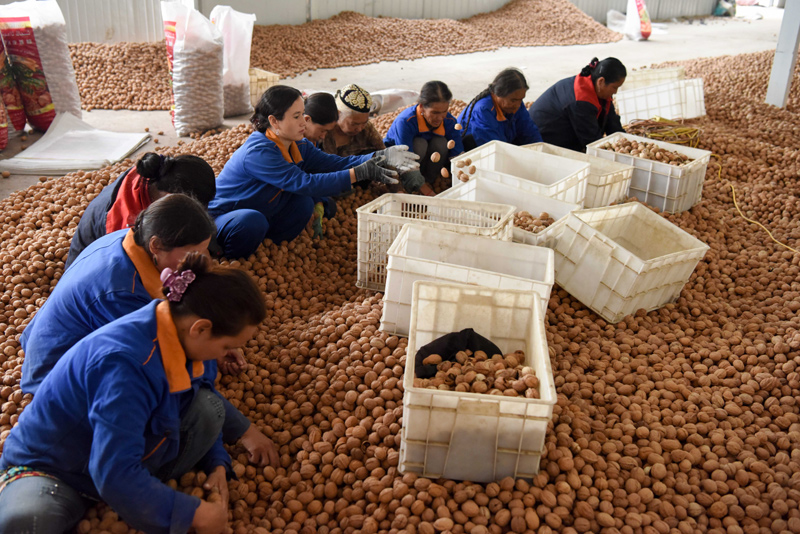
Farmers are sorting walnuts at a farmer’s professional cooperative in Hotan County, Hotan Prefecture, Xinjiang (photo taken on September 6). Xinhua News Agency reporter Ding Lei photo
"Without sales channels, even the best walnuts can’t be sold." Ezra Gapa said that the 8 tons of walnuts he bought last year sold at a good price. This year, while the quantity increased, he also launched several new walnut processing equipment to expand the scale and extend the industrial chain. He said: "Now I can’t wait to use it for two days a day."
In recent years, Xinjiang has started the construction of the purchase network and the sales network of characteristic agricultural products in Xinjiang, which has opened up the "two veins of appointment and supervision" and solved the big problem of agricultural products sales.
"In the past, growing walnuts depended on the weather. Now we introduce advanced management technology to guide farmers to scientifically grow walnuts. We also use the advantages of the resident group to help walnut growers find sales and make walnuts worth it." Alijiang Yishak, a resident cadre in the village, said that the walnuts in the village have not only gone out of the village, but also been wrapped in gift boxes and boarded high-speed trains, and sold at a good price.
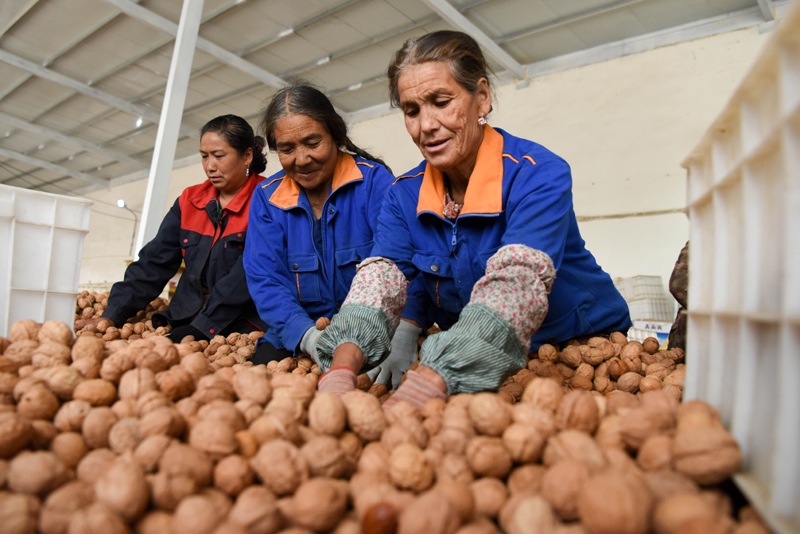
Farmers are sorting walnuts at a farmer’s professional cooperative in Hotan County, Hotan Prefecture, Xinjiang (photo taken on September 6). Xinhua News Agency reporter Ding Lei photo
Benefiting from this, Ezra Gapa’s walnut business has become more and more prosperous, and its business scale has also developed from a manual workshop to a cooperative processing factory.
In January this year, Aizila Gapa and five farmers jointly funded the establishment of the cooperative. Driven by policies such as industrial poverty alleviation, as a rich leader in the village, he also took three poverty-stricken households who set up a file to become shareholders in the form of funds. At present, the cooperative has radiated the employment of 45 poor households around him.
"In the past, planting walnuts was to support the family. Now I earn money, I am full of energy, and my days are beautiful." He said with a smile.
In southern Xinjiang, there are more and more farmers who struggle and get rid of poverty like Azroula Gapa.
Helping the poor first helps the ambition, and helping the poor must help the wisdom.
Gulihan Hudaberdi got rid of poverty last year. When talking about the great changes in life, she always can’t hide her smile.
Gulihan Hudaberdi was born in Yigeziya Township, Yingjisha County, Kashgar, which belongs to a typical shallow mountain poverty-stricken area. The rugged terrain makes the cultivated land fragmented, the running water can’t survive, the soil layer is not thick, and the ecological environment is fragile … A series of difficulties have accompanied the farmers and herdsmen living here with poverty for generations.
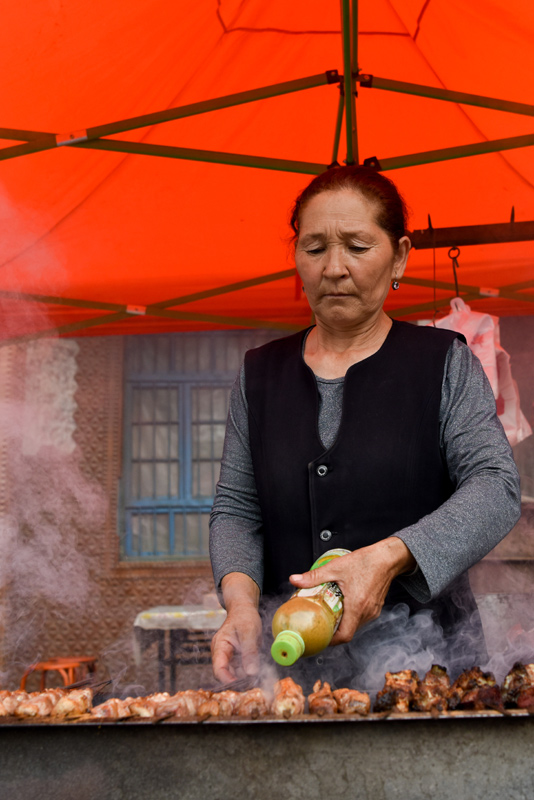
Gulihan Hudaberdi helps barbecue at his son’s barbecue stall in Yigeziya Township, Yingjisha County, Kashgar, Xinjiang (photo taken on August 13). Xinhua News Agency reporter Ding Lei photo
A year ago, with the support of the government, her family put down their hoes and sheep whips. Gulihan Hudaberdi opened a shop in the center of the village. The eldest son set up a food stall at the door of the shop to sell barbecue, and the youngest son also achieved employment in public welfare posts arranged by the government. The average annual net income of the family exceeded 50,000 yuan.
"Poverty is not shameful, it is shameful to be content with poverty. The happy life in the future can only be created by our own hands." Gulihan Hudaberdi, the talking director, told reporters repeatedly.
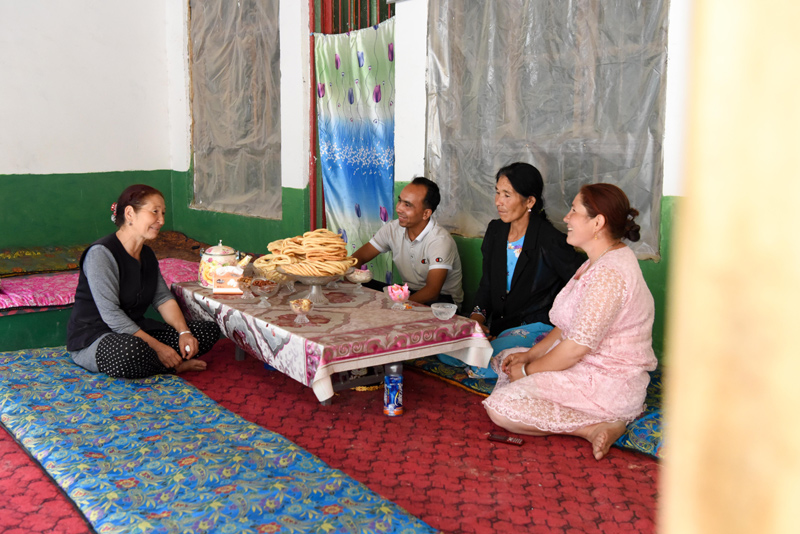
Gulihan Hudaberdi (left) chats with his neighbors at home in Yigeziya Township, Yingjisha County, Kashgar, Xinjiang (photo taken on August 13). Xinhua News Agency reporter Ding Lei photo
The poor people in the four prefectures in southern Xinjiang have low employment skills and narrow ways to get rich, so it is usually difficult to start their own businesses to get rid of poverty. In this regard, Xinjiang has issued a series of free vocational skills training policies to help disadvantaged groups achieve employment and entrepreneurship through multiple channels and help them get rid of poverty.
Getting rid of poverty is only the first step, and better days are yet to come.
In recent years, Xinjiang has increased its support for labor-intensive industries such as textiles and clothing in four southern Xinjiang States. With the continuous improvement of the business environment, many enterprises with high industrial relevance and good benefit prospects have settled in southern Xinjiang. More employment opportunities have prompted rural surplus labor to become industrial workers and no longer rely on the weather for food.
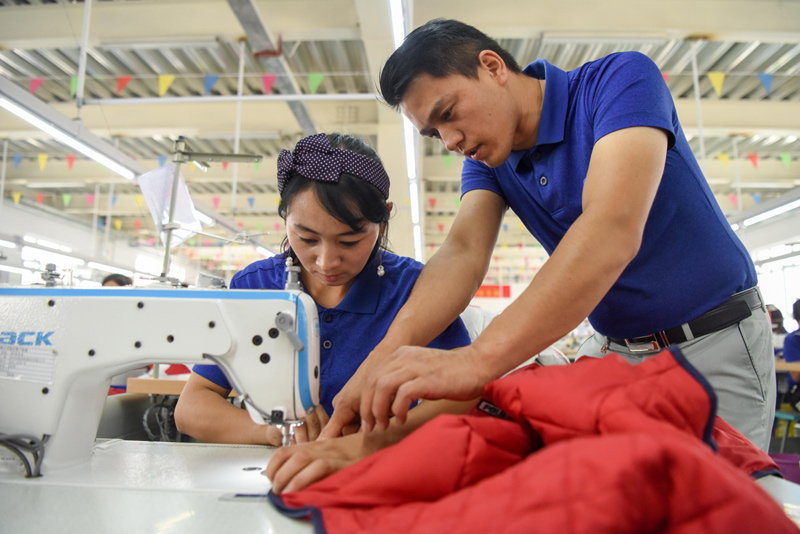
Mai Ti Tuo Heti Aikemu (right) is teaching his wife sewing skills at the clothing industrial park in Xianbai Bazaar Town, Yutian County, Hotan District, Xinjiang (photo taken on August 25th). Xinhua News Agency reporter Ding Lei photo
28-year-old Mai Ti Tuo Heti Akmu is very busy this year. A few months ago, MaiTi Tuo Heti Akemu, who has tailor skills, applied to a textile and garment enterprise. Under the guidance of professional technicians in the mainland, she has grown into a technician in the production workshop, and started to take apprentices while doing her job well.
Mai Ti Tuo Heti Aikemu lives in Bashsayibage Village, Bazaar Town, Yutian County, Hotan area, and mature industrial workers like him are rare in the local area before.
Today, MaiTi Tuo Heti Aikemu has a steady income of more than 3,000 yuan every month. Not long ago, his wife also entered the factory as an intern. Their family not only got rid of poverty by stable employment, but also embarked on the road to wealth.
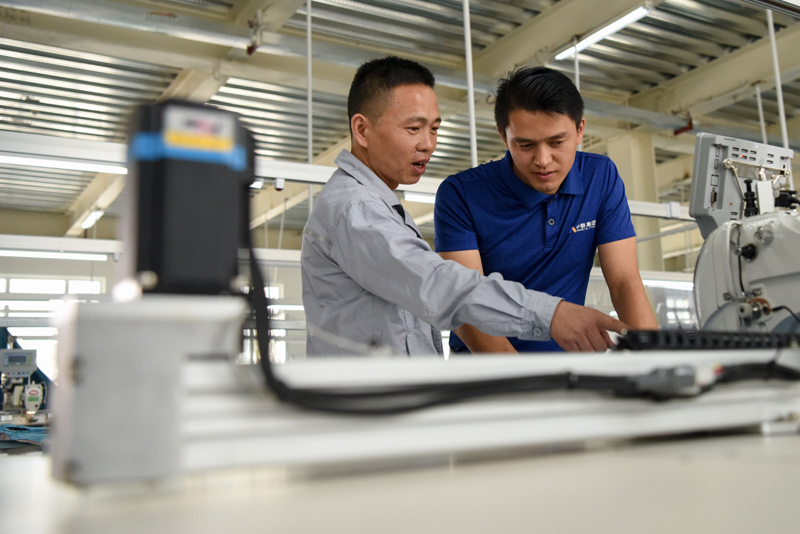
Mai Ti Tuo Heti Aikemu (right) learns advanced garment technology from mainland technicians in the garment industrial park of Xianbai Baza Town, Yutian County, Hotan District, Xinjiang (photo taken on August 25th). Xinhua News Agency reporter Ding Lei photo
With the industrial support, not only poor households have been lifted out of poverty, but also more mature industrial workers like Mai Ti Tuo Heti Aikemu have been trained for the subsequent development of the industry. A few months ago, Bibijiang Daierweixi, a housewife in Tongan Township, Zepu County, Kashgar, achieved employment in a textile cooperative at her doorstep and earned her first salary. "I used to take care of my children, cook, and clean up the housework. Everything depends on my husband. Now that I have made money, I have also propped up the’ half the sky’ at home. " Bibijiang Delwesi said.
In the past five years, Xinjiang’s textile and garment industry has invested more than 170 billion yuan in fixed assets, and more than 2,200 new textile and garment enterprises have been established, with a cumulative increase of more than 450,000 jobs.
"Poverty alleviation is only the first step, and better days are yet to come." Mai Ti Tuo Heti Akemu said that he intends to learn more experience from mainland technicians in order to obtain a higher qualification technical certificate.
He is full of confidence in his future life.